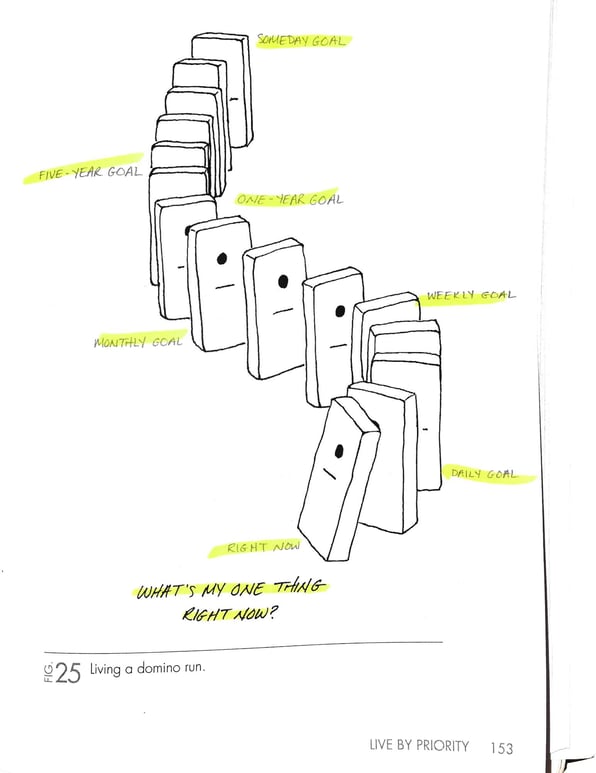We like being busy. So, what do we do? We overwhelm ourselves so we can feel like we’re being productive. But, what happens next is the feeling of being over-burdened and anxious because we have way too much on our plate.
Burnt out, stressed out and faded
The reality is that 25-50% of people report feeling burnt out at work. They don’t feel like they’re making any serious progress and they’re being worn down because they’re being pulled in every direction at once. This is common, and the technology seems to have exacerbated the problem.
“What we’ve lost, above all, are stopping points, finish lines and boundaries. Technology has blurred them beyond recognition. Wherever we go, our work follows us, on our digital devices, ever insistent and intrusive. It’s like an itch we can’t resist scratching, even though scratching invariably makes it worse.” – Tony Schwartz
When it comes to getting better at anything and staying productive, there’s a simple strategy that we can use — and that’s to only do one (1) thing at a time.
When we do only one thing, we are picking the most important task and using our creativity and energy to attack it from different angles. We ponder and wrestle with this one task, and as a result, we synthesize some tough concepts into actionable processes.
It’s all about mastery
Getting really good at anything requires massive effort in a single direction. As the saying goes, repetition is the mother of all learning. Mastery can only occur when you focus your limited time, energy and resources in a specific area. It’s about being clear on what needs to be done and giving yourself the room to explore the nuances of the problem, skill, task, project, proposal, and much more. You can only get close to mastery when you make productive efforts – because productivity generates small wins that propel you forward by boosting your enthusiasm and optimism to take on new and greater challenges.
Research in Psychology shows that we really thrive when we’re presented with surmountable challenges. It’s the nature of the challenge itself that motivates us. When participants in Edward Deci’s experiment were present with monetary rewards for completing challenges, their motivation and interest went down. We humans love engaging in challenges just for the sake of doing it.
The illusion of multitasking
We have the illusion of being able to multitask when we’re driving and talking, making pancakes and drinking our coffee, or walking our dog and using our mobile device.
But, the science is in: our brain doesn’t do two tasks simultaneously, instead, it rapidly switches focus and energy to each task. This is fine for doing simple and habitual things, but not for hard tasks. The constant switching drains precious energy and focus, shilst building up attention residue when we’re juggling difficult and complex tasks. In short, we’re at a huge disadvantage because we can’t do our best work.
Be intentionally myopic
Doing the one important thing is not easy, because we have to think, plan and organise ourselves to be able to execute our task. But, it is the most efficient way to complete tasks. Research shows that when we only focus on one thing, we finish that task 25% faster, and with increased veracity than if we were to multi task.
One of the hurdles to completing your ONE thing is avoiding incoming distractions. A remedy is to structure your day so that you have a pocket of time to yourself to be intentionally myopic — this means that no other task matters until you finish your one important thing.
For us to be able to only focus on one thing means that this ONE thing has to be something that is pivotal for success in our career, business or life. This is not a small thing — it’s one BIG thing!
For example:
1) Getting a pay rise
If you want a pay rise, then make that your one thing. Work hard at collecting all the evidence that you’re a valuable asset to your boss, measure your contributions, settle on a number, practice some negotiation tactics and then, actually book the meeting with your boss to execute your goal.
2) Increasing revenue for your business
If you’re a business owner, and you want to increase revenue, think really hard about the one area where you can invest your time and effort that will pay off the most. You may find that referrals are getting you most of your growth, so really make it a point to delight your current customers and set up incentives so that they can easily refer you to their friends.
I’ll say it again, doing the ONE thing is not easy. It takes real dedication and disciple. But the payoff is that you’ll leave no stone unturned in a specific area, and you be engaging in the activities that actually increase your capital; whether that’s for your career, work or life.
Do the thing that increases your capital
Doing the ONE thing is not a new business philosophy — it's based on science. Specifically, the Pareto Principle.
The Pareto Principle states that roughly 80% of the results will come from roughly 20% of the causes.
This can actually be measured. Even in a successful organisation, 80% of the productivity comes from 20% of the people. 20% of the trees in an orchard will produce 80% of the apples, and 80% of all the light in our solar system comes from 20% of the stars in it. If you want to be productive, you have to perspective from getting everything done, to only getting the right things done. Find the 20% of actions that result in the majority of your gains, and hyper-focus on them.
“How we phrase the questions we ask ourselves determines the answers that eventually become our life.” — Gary Keller

Image sourced from www.meaningfulhq.com
A little discipline in focusing on your ONE thing goes a long way in helping you get to your ultimate goal. It transforms you from being reactive to being purposeful with your time and energy. It lets you take real ownership of your journey toward success.
So, think hard about your ONE thing, write it down and share it with a mentor or a close friend. When you write down your goals, you are 39.5% more likely to succeed, and when you tell a trusted person who’s agreed to hold you accountable, you are 76.7% chance more likely to succeed.
Here’s how you can set yourself up to focus on the ONE thing
1. Find your Autonomy
We thrive in areas that are self-selected and self-directed. Find a pocket of time, or a location where you can have autonomy and be left to explore your one important task without interruptions. Self-selection is imperative, because when you choose the task, you care about the outcome.
2. Develop a ‘Master plan’
Outline the steps that you’d need to take in order to be an expert at this one thing. This lets you see the nature of your investment in this task or skill, and also helps you realise if the task is actually worthwhile for your long term fulfilment.
3. Tie your actions to your purpose
Remind yourself of the material and emotional significance of completing the task or learning the new skill. Everything you do has a deeper need, even if you don’t realise it just yet. Some of the core human needs are self-discovery, self-esteem, belonging, safety, health and wellbeing.
Your creativity blossoms when you do one thing
When you constrain your attention to one thing, you start to see the possibilities and the solutions extremely clear. When you keep things simple, everything you’re doing has utility and intention. You zone in on the problem, you wrestle with it, and you begin to understand it at its core. Simplicity is about cutting the fat and dealing with the important issues only – it doesn’t make the tasks easier, however it does make your efforts more productive and efficient.


